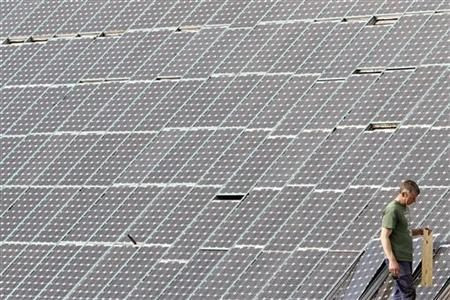US Holds Fire In 1st Salvo On Chinese Solar Companies

U.S. trade officials imposed surprisingly low tariffs on Chinese solar panels, choosing to tread lightly and avoid an all-out trade war when addressing U.S. solar companies' complaints of unfair trade practices.
The Commerce Department announced on Tuesday preliminary duties between 2.9 percent and 4.73 percent on Chinese solar cells and panels in response to a complaint by seven U.S. solar panel firms, the Wall Street Journal reported.
The tariffs came in response to accusations the Chinese government provides local solar manufacturers with unfair financial assistance.
The International Trade Commission must find U.S. companies are being harmed by the imports before the preliminary tariffs can take effect. The panel's vote on the measure is expected in June.
U.S. imports of Chinese solar cells topped $3 billion last year, double 2010's amount.
The U.S. solar industry has suffered, as a glut of supplies coming from China has driven prices down and shuttered some companies, a situation which the Chinese government recognized and promised to remedy.
We will prevent blind expansion in our capacity to manufacture solar energy and wind power equipment, Chinese Premier Wen Jiabao said in a speech last week at the country's annual meeting of its legislature.
China's major solar panel companies have denied charges of dumping or unfair government support. The manufacturers claim the duties will only hurt the U.S. solar industry in the long term. Analysts expected higher tariffs, and the market responded to the figures by driving up the price of shares of Chinese solar companies.
Punitive tariffs of less than 5 percent would be manageable for Chinese solar makers given that their panels are sold 25 to 30 percent cheaper than U.S.-made panels, said Min Li, head of alternative energy at research firm Yuanta Securities, according to Reuters.
The newly imposed tariffs may be the first of several, as the Commerce Department mulls accusations that Chinese manufacturers are selling solar technology at below fair value.
The next investigation by the Commerce Department could lead to tariffs between 10 percent and 100 percent, Jesse Pichel, an analyst with Jefferies & Co. told the Journal.
The solar panel kerfuffle is just the latest in recriminations against China. Last week the European Union, U.S. and Japan brought accusations of Beijing enforcing restrictive policies against exporting rare earth metals.
For its part, China's Ministry of Commerce accused the U.S. of protectionism, promising to investigate U.S. subsidies for clean energy, while Chinese firms accuse U.S. suppliers of low-balling the price of polysilicon. Beijing, however, has largely made overtures toward an amicable resolution.
It's normal for the two sides to have frictions and differences of views, said Chinese Foreign Ministry spokesman Hong Lei, according to the Journal. But it's important that the two countries have friendly consultations to resolve such issues based on mutual respect and equality, and we should not allow such restrictions to impair the sound and steady development of U.S.-China economic relations.
The Commerce Department's measured response could reflect an attempt at keeping market prices low, Kelly Dougherty, an analyst with Macquarie Capital USA, told Bloomberg.
If they were to slap double-digit tariffs, the Chinese companies, who have razor-thin margins, would have to pass them down to customer, and that would hurt demand, Dougherty said.
The tariffs have faced a mixed reception within the U.S. solar industry, according to the Wall Street Journal.
Germany's SolarWorld AG has led the charge against Beijing's practices, and welcomed the tariffs.
Every little bit helps, Gordon Brinser, president of SolarWorld's U.S. unit, told the Journal. Our whole intent here is to rebuild American renewable-energy manufacturing.
The Coalitions for Affordable Solar Energy, a collective of over 100 solar companies, welcomed the relatively low tariffs as a victory, after arguing against the Commerce Department's investigation.
This is a victory for the solar industry, Jigar Shah, president of the coalition, told Bloomberg Businessweek. The government of China was found innocent of all charges, that's what low tariffs mean.
Chinese company Suntech Power Holdings Co., the world's largest maker of solar panels, shrugged off the duties.
This initial decision reflects the reality that Suntech's global success is based on free and fair competition, Suntech's chief commercial officer Andrew Beebe said, according to the Journal, adding, Unilateral trade barriers, large or small, will further delay our transition away from fossil fuels at a time when the majority of Americans demand cleaner and more secure energy.
© Copyright IBTimes 2024. All rights reserved.





















